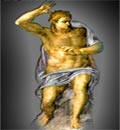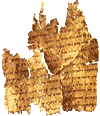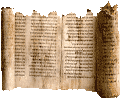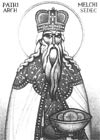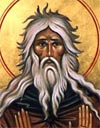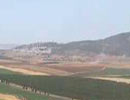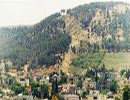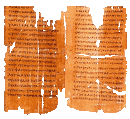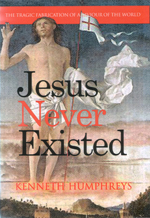Man or Myth?
"Everything personally pertaining to the Nazarene, including the forty days and forty nights in the wilderness (of which we know virtually nothing), can be compressed into approximately eight weeks – which can hardly be called a 'life.'
This fact alone should convince any individual of sense that there was never a Jesus of Nazareth."
– Nicholas Carter (The Christ Myth, p89)
"Oh No! It's Elijah, the Tishbite!"
Hair-shirted Elijah (Elias) was chosen by God and made a name for himself by murdering 450 priests of Baal (1 Kings 18.40) and 100 men sent to arrest him (2 Kings 1.1,8).
God was delighted. Without even dying first Elijah was raised to heaven. (2 Kings 2.11)
His SUV was a "fiery chariot" (possibly the one parked up by Apollo).
What's in a name?
Eli'sha = God is salvation
Eli'jah = God is Jehovah
Je'sus (Yeshua) = Jehovah saves50+ parallels (off-site link)
Qumran – Many Tenants
Qumran – first settled during the Maccabean era and last occupied by Roman troops during the war against Bar Kochba (130-135) the Dead Sea "monastery" is forever linked to the Essenes.
The Essenes appear to have used Qumran as a training camp from the time of Archelaus (Herod's son, 4 BC - 6 AD) until being scattered by the Romans in 68 AD.
• War Scroll
The War Scroll dates to the period of intensified anti-Roman and Zealot activity (37 BC-68 AD).
The War scroll combines prayers with military and religious preparation for an apocalyptic war.
The 'children of light' and the angels will triumph over the devil Belial and the 'children of darkness', identified with the Kittim (the Romans).
• Damascus Document (aka Cairo Document or 'CD') (2nd/1st century BC).
Exhortations and rules of a group of exiles "in Damascus".In this scroll the 2 messiahs of earlier texts (1QM 11.7-8) are combined into one, the "Messiah of Aaron and Israel" or the "Scion of David" (4QPatBls 1.34). He will arise at the "End of Days". (4QpISa).
But the scroll also foretells that a great prophet or "Interpreter of the Law" (an "Elijah") will return at the end-time with the messiah. (4QFlor 1.11)
The Real Deal
The Christian novelists strove to deflate the claims of rival John the Baptist fans.
They identified the Baptist as both JC's cousin and as a reborn "Elijah" – reducing him to a mere forerunner of the "real thing".
• Copper Scroll
A list of hidden temple treasures and weapons. 64 coded locations where vast caches of gold, silver and jewellery are to be found (or maybe not).
• Temple Scroll.
The rules for building a massive temple, how, when and why of sacrifice, rules for communal purity. All 28 feet of it.
" If a man is a traitor against his people and give them up to a foreign nation, so doing evil to his people, you are to hang him on a tree until dead."- Temple Scroll 11Q 64:7-8
Consolidating the Lord
The parables of the Book of Enoch merged the "Son of Man," the "Just One," the "Elect One," and "the Anointed" into ONE person.
"Melchizedek" – a play on the words "righteous peacemaker".
"Archangel Michael" – another member of JC's extended family.
"Angelic Being, Man in Heaven"
So who is it – Elijah? Enoch? Melchizedek? Michael?
Why don't we just call him Jesus?
The early Christians scribes, convincing themselves that their Lord and Saviour had indeed walked upon the earth, drew most of their inspiration for his brief "ministry" and wonder-working from the vast stock of Jewish sacred writings. Scavenging through the pious romances and holy heroics of Hebrew scripture they found edifying story lines and useful characterisation to fill a whole eight weeks or so of "biography" – and that includes 40 days and nights in the wilderness. Useful extra detail was gleaned from the works of Josephus, the Jewish historian and a handful of other texts. In time, of course, this so-called "life" would all be back-projected as the "fulfillment of prophecy" – art imitating artifice. Only the rational mind sees plagiarism and deceit. To those who already "believed" it was the majestic design of an ineffable God, weaving the wondrous image of his only begotten son across several centuries of Jewish history, the misadventure and internecine strife of an entire people reduced to the prologue for the Christian godman.
Profiting from the Prophets
Thus, the apostasy of the northern kingdom was followed by the anticipations of Amos, Hosea and Micah. Israel's demise was belatedly foretold by Jonah, Zephaniah and Jeremiah. The failure of Josiah's reforms in Judah and the Babylonian exile were foreseen in the later works of Habakkuk, Ezekiel, Obadiah and an updated Jeremiah. Ezra, Nehemiah and Isaiah, of course, anticipated the earlier deliverance by the Persian king Cyrus, and the later Haggai, Zechariah and Malachi had known of the Temple's rebuilding well in advance. Joel and Daniel, though a little late in getting published, foresaw the coming of the Greeks. For some reason (the intrusion of Greek rationalism?), after the 5th century new prophets failed to materialize. Instead the old prophets, such as Isaiah and Daniel got pertinent updates – a veritable 'back to the future' in the arcane art of soothsaying. To the Christian heretics of the 2nd century the prophetic literature was manna from heaven. They shamelessly re-purposed the entire corpus for a single design: the pre-figuring of their godman.
Words from On High – "End Time Prophet" During the era of the Hasmoneans, even within mainstream Judaism, the conviction was growing that an eschatological prophet, like Moses, Amos and Hosea of old, who would soon reappear to deliver God's judgement on a sinful world. This prophet would anoint a 'messiah' (a 'Christ' in Greek translation) who would once again deliver his people from their time of trial. In the minds of the pious fantasists three types of hero – priest, king and prophet – blurred and took on each other's traits. Thus in the 5th century Book of Kings (later split into two books) we have the delightful story of Elijah the Tishbite and a foretaste of an elaborate fantasy later to be ascribed to an altogether more illustrious hero. Elijah, it seems, passed his apprenticeship in a wilderness east of the Jordan river known as the Kerith Ravine. Here he was brought bread and meat by ravens. He moved on to the town of Zarephath and the hospitality of a starving widow. In gratitude Elijah performed a feeding miracle: he "multiplied" her barrel of meal and jug of oil so that they never ran out. (1 Kings 17.6) Despite the presence of the holy man the widow's child died but his death afforded Elijah the opportunity – with the True God's help, of course – to raise him back to life:
With irresponsible abandon (later to be seen in someone else's disciples) Elisha "went after Elijah, and ministered unto him", having cooked up the oxen and kissed his parents goodbye! (I Kings 19.21). After various adventures vanquishing false-gods, a Moses-like dividing of the waters of the river Jordan (2 Kings 2.8), and with a successor in place, the scene is now set for Elijah's grand finale, being raised to Heaven. But first he assures Elisha that if "thou see me when I am taken from thee" he will get a "double portion" of holy spirit. Cue the celestial transporter:
The new man Elisha, with double-strength Holy Spirit, immediately repeats the water trick (2 Kings 2.14). It is the start of a remarkable career of blessings and curses which upstage his mentor. Debt relief via an endless supply of saleable oil (4.1,7). Food miracles involving wild vine and gourds (4.41) and the feeding of 100 men with just 20 loaves (with leftovers!) (4.42,44). He both cures a leper (2 Kings 5.14) and then inflicts leprosy upon his own servant (and his descendents forever!) (5.27). He creates an army of horses and chariots (6.17) and both blinds and restores the sight of a whole Syrian army (6.18, 20). And of course what sort of prophet would he be without powers over life and death. To a childless woman he grants a child (2 Kings 4:16) and when the child dies from a fall he restores him to life (4:34):
"Elisha" serves a revisionist historian's purpose in a re-telling of theocratic-politics in 8th century BC Judaea. The point has to be made that, no matter who you are, if you step outside the officially sanctioned belief system of the priests you will be murdered. Who would have guessed that centuries later another generation of priestly fraudsters would be pillaging the Elijah/Elisha saga for elements to augment an even grander story.
The Seed Bed of Saviours Enoch Sole mention of this fellow in the Hebrew bible is in the list of Adam's descendents found in Genesis. Enoch is the sixth generation from Adam, father of Methuselah and great-grandpa' to Noah, living to the grand old-age of 365. The only other interesting snippet we learn of Enoch is that the scribbler who dreamed up the genealogy breaks the poetic pattern of "and he died" for Enoch alone. Instead we get this:
Not much to go on, but believe it or not the basis for a vast outpouring of Enochian literature around the beginning of the Common Era. The Book of Jubilees made an early contribution to embellishing the name and reputation of 'Enoch', naming a wife and sundry relatives unknown to Genesis. Over a period of 200 years or so – particularly during the Maccabean struggle against Hellenization – several major fantasies featured this ethereal hero, five of them eventually collected into the Book of Enoch:"The Watchers" (fallen angels, chained up by god.); "Parables"; "Astronomical Treatise"; "Dream Visions"; and a "Letter to his children". Among Enoch's numerous adventures are a descent to hell, a visit (with an angel) to the mountain tops, and the gift of eternal life. 'Parables' introduced the novel concept a divine figure standing alongside God, pre-existing from before the creation, and taking over many of God's attributes and functions. In particular, the mystery guest gets the job of sitting on the heavenly throne and judging humanity. Initially, he is identified only as the Elect One, the Anointed One, and the Son of Man but the final chapter of Parables identifies this exotic character – none other than Enoch himself!
From Enoch to Jesus? A trace of the primordial saviour Enoch is even to be found in the New Testament, in the quasi-Jewish, mildly apocalyptic, text which masquerades as the "Epistle of Jude". This brief letter targets "filthy dreamers ... turning the grace of our God into lasciviousness ... feasting with you ... walking after their own lusts." Why – who would imagine that charlatans would make use of religion to con a living out of the gullible and get their hands on the women? Tellingly, Jude draws its curses on the fornicators from the non-biblical Book of Enoch (1.9) and the equally non-biblical "Assumption of Moses" (a yarn in which the Devil, on the basis that Moses is a murderer, claims the body). Enoch has moved on from his Genesis days. He's now a prophet of the Lord's Judgement:
In this entertaining drivel, Enoch himself doesn't get a mention but a character called Christ is moving up the pecking order.
Melchizedek, King of Salem With a name that means "righteous king of peace", this phantom has a curious bit part in Genesis – to deliver the blessing of "the most high" god ("El Elyon") to Abraham. The occasion is the successful slaughter of an alliance of enemy kings (Genesis 14.18,20). An obviously delighted Abraham hands over a tithe of everything to the (non-Israelite) priest/king Melchizedek. What's especially curious about this is the clearly implied pecking order. Melchizedek blesses Abraham; Abraham gives Melchizedek his rake-off. Yet it is Abraham who has been chosen by the Lord Almighty to sire a "great nation." So what are we to make of the "righteous king of peace"? Why isn't he siring a great nation? A document from the Dead Sea Scrolls (11QMelch) throws a little light in this dark corner (in truth, the original story was just badly thought out – a bit like John the Baptist baptizing Jesus in Mark's fable). The scroll tells us that Melchizedek is a "heavenly being who will bring salvation," a being identified as a personification of the the archangel Michael – see below (Porter, p39). We have another contribution from gnostic literature. Here, Melchizedek
is not only a heavenly priest but a warrior also:
From Melchizedek to Jesus? Like Enoch, Melchizedek also scrapes into the New Testament, in the so-called "Epistle to the Hebrews", where he serves to legitimise the emerging composite superhero known as Jesus Christ and hand-on to him certain characteristics. Law enforcement had been the inheritance of the Levitical priesthood and the "order of Aaron". Yet Jesus Christ, "out of Judah; of which tribe Moses spake nothing" (7.14), single-handedly replaces the entire Levite/Zadokite priesthood and becomes the perfect high priest "forever". It is useful,
therefore, that Melchizedek defines another "order" – even
if that "order" has only two members – Melchizedek
and Jesus!
The homage paid by Abraham to Melchizedek in the original Genesis verse, therefore, could be held to "prefigure" the subordination of Judaism to its upstart heresy – Christianity.
Michael the Archangel Completing the triad of prototypes for the earth/heaven interface of Jesus is none other than "Michael the Archangel", he who contends with the Devil for the body of Moses in Jude (1.9) and leads the good fight in Revelation:
Most of Daniel was written during the 2nd century BC Maccabean revolt when various "beasts from the sea" posed a dire threat to Jewish intransigence. The story sets a "righteous hero", Daniel, in an earlier time of trial (the Babylonian exile) and has "Michael, one of the chief princes" protect him. The yarn is actually based on a much earlier (14th century BC) Canaanite text found at Ugarit, Syria. This Tale of Aqhat stars Dan'il (dn'il), a righteous king and judge. Daniel, of course, symbolizes Israel and reassuringly, "shall Michael stand up, the great prince which standeth for the children of thy people." (12.1) Daniel is
notable for its apocalyptic vision of the future which was developed
into that gore-fest known as Revelation. Daniel also
has a trailer for the celestial deliverer:
Whatever else, we have the appearance of an angelic being as man in heaven. The story is a work-in-progress. Daniel inspired the author of Revelation and unlike the
Gospels, Revelation is a genuine 1st century tract. In
this apocalyptic vision the Christ character is far from fully
developed. Christ vies with Moses and Michael in the celestial
pecking order, rival agents of God's will.
|
||||||||||||||||||||||||||||||||||||||||||||||||||||
First and foremost were the books of 'the Law', originally written during the reign of King Josiah (641-611 BC). The so-called Mosaic code or Torah (aka the Pentateuch) formed the core of an 'approved list' drawn up in the 4th century BC by an author who was a scribe/politico and racial purist. He wrote under the pseudonym of Esdras (Ezra). The set of books known as 'the Prophets' or '12 heroes of Israel' (there are actually 17 of them) gained recognition during the early 2nd century BC. 'The Writings' – psalms, proverbs, and wisdom literature – were the last to receive the priestly seal of approval and the rabbis argued over some of them into the 3rd century AD. But as it was, a reconstituted council of the Sanhedrin met in Jamnia in 90 and again in 118 AD, and pronounced on what was divine and what was profane. Significantly, they rejected the newer books – such as Jubilees, Enoch, Maccabees, Proverbs, Song of Solomon, Ecclesiastes and Esther – the very works popular with proto-Christian heretics.
Four of Josephus's works survive: The Jewish War (a history of the Jewish revolt against Rome, 66-74); Antiquities of the Jews (a more comprehensive history of the Jews, based mainly on Jewish scripture); Against Apion (a defence of Judaism); and an autobiography Life (which reveals some interesting parallels to the 'life' of the apostle Paul).
|
Sources:
J. R. Porter, The Lost Bible (Duncan Baird, 2001)
Nicholas Carter, The Christ Myth (Historical Review Press, 1993)
Michael Grant, Jesus (Weidenfeld & Nicolson, 1977)
N. Page, The Bible Book (Harper Collins, 2002)
Robin Lane Fox, The Unauthorized Version (Penguin, 1991)
J. Packer, D. Williams The Bible Application Handbook (Eagle, 1999)
Thomas Sheehan, The First Coming (Random House 1986)
Gordan Thomas, The Trial (Bantam, 1987)
|
||||||||||||||||||||||||||||||||||||||||
|
|
|
||
'Save' a friend e-mail this page
